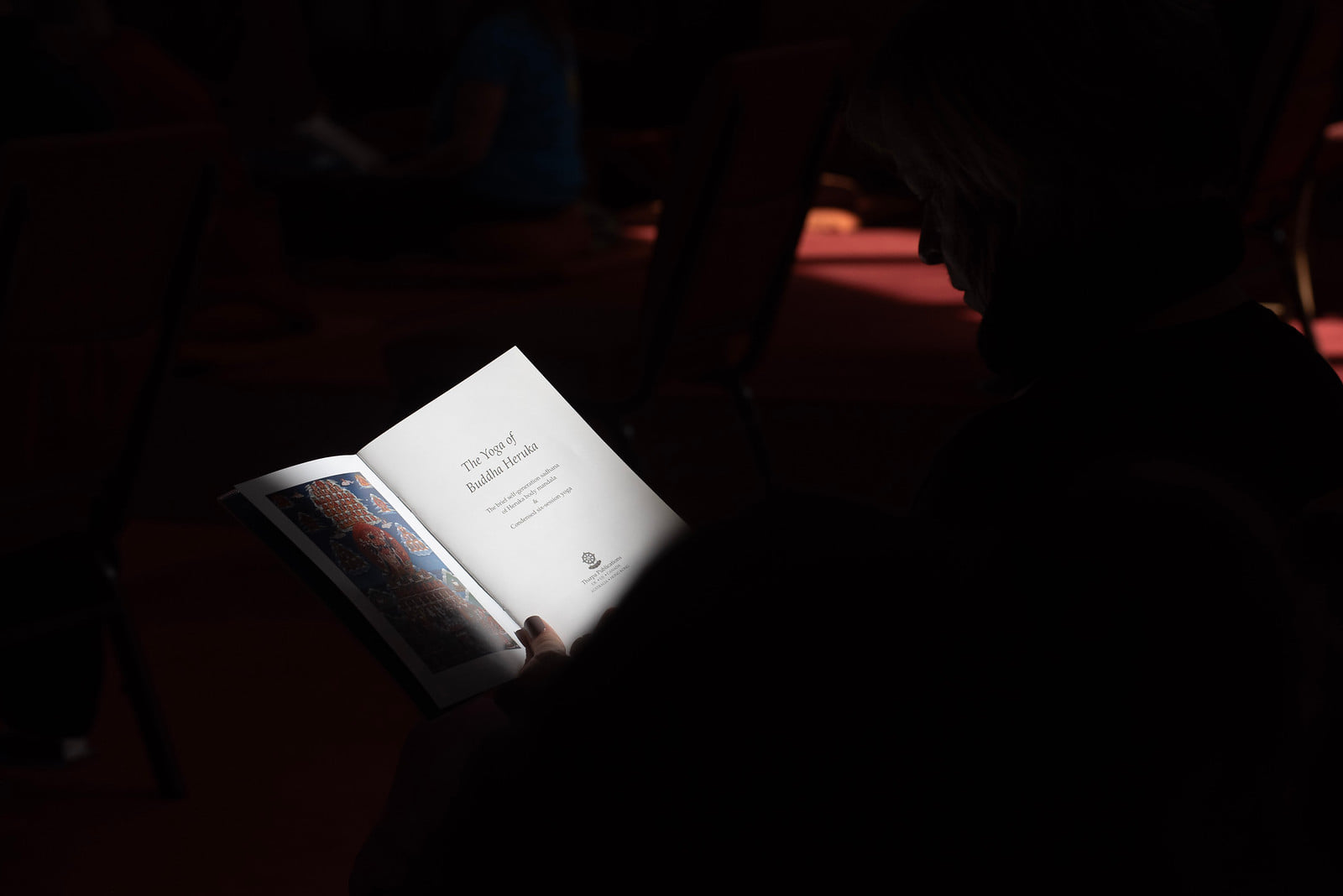Free Yourself from Reader Ghosts for Deeper, More Mindful Writing
When we’re caught up in what an imagined audience will think about our writing, we are much less likely to actually write anything. Mindful writing teacher and former state poet laureate Alexandria Peary explores how we can (re)discover the...

I spend a lot of time in my own company. The older I become, the more I enjoy being with myself on hikes, shopping, sitting on the porch looking at the green scribbles of oaks in spring, cooking, and especially in that natural habitat of solitude, writing.
I am delighted by my own company at the desk; it feels like I’m dropping in on my best buddy for a few hours in front of a computer screen.
The fact that I am able to spend hours alone professionally as a writer is not a given. Most people are never left alone as they write because they squander precious lone time to perform for an audience who is not in the room and may not even exist. That is, they’re caught up in worry about what an imagined audience will think of what they write, and they let that worry dictate what they do and don’t create. Most people allow imaginary readers to influence their enthusiasm for writing. Once our mood is downgraded to doubt, our writing process faces the consequences (do we allot sufficient time for all stages? can we remain nonjudgmental and receptive to find new ideas? can we keep drafting and wisely revise and edit?), often leading to a final draft of moderate to full-blown disappointment.
If your dial isn’t set to operating on solo, if you’re operating mindlessly, then you are likely struggling with your writing. Basically, you’re giving reader ghosts carte blanche to the wonderful freedom––from criticism, from performing-to-expectation––that is the present moment’s gift to you at the desk. It might show up in thoughts like, “This piece isn’t going well,” or “I really don’t like to write,” or even “I might have a serious case of writer’s block.” In the best-case scenario, you’re simply not writing at your optimal level.
I can’t underscore this enough: When we write, we are alone and separated in space and time from readers, and that’s a healthy thing. Any reader who you think waits to be served by your words is a figment of your imagination and, depending on how unaware you are of this situation, an act of mindlessness.
Look around. Where’s your audience? That Ficus plant? coffee cup? throw pillow? space heater? Your audience is literally all in your head.
As writers––and I mean anyone typing or handwriting any document, job memo to sonnet––we sometimes try to connect with other people in the most misguided, limiting, and masochistic ways. We jettison the No Judgment Zone where the only rent is our inhalation /exhalation and instead pander to a mob of future- or past-based reader ghosts, most of whom don’t have our best interests at heart despite wearing READER crew shirts as they work the event of our writing backstage, outside our awareness.
As we wheel our chair closer to the desk, turn on the monitor, up pop a few shapeshifters who vaguely resemble a boss, teacher, committee, or editor. They move in and out of focus, half not-here, a state which makes sense because they are in fact not present, abstractions in foggy outfits and with hazy expressions—just a certain pressure from the past or future. These readers will trash your writing experience, overturning the ideas that took special effort to prepare, leaving you to deal with the mess of frustration, procrastination, fear of failure, low word count, withered pages, and reams of coffee-ringed or wine-glass-ringed doubts scattered on the floor.
It’s not their fault, really: As creatures from the future, reader ghosts arrive at our desks to demand a document from the future, a polished final version you logically haven’t yet had time to write. As apparitions from the past, they lug pre-set formulations about our writing ability, cast in the concrete of the past, and expect us to incorporate those fixed errors in our current writing. So, our “readers” glare disapprovingly at our messy drafts, our new approaches, causing us to delete and second guess. Don’t blame those ghosts: You summoned them through how you’re talking to yourself at the desk.
Who Are You Writing For?
Writing is a one-way glass kind of conversation. Writing is talking to ourselves for minutes or hours at a time. With that comes distorted perceptions and mindlessness as we believe hook-line-and-sinker our self-talk. Easily one of the biggest distortions is the installation of a nonexistent audience in our workspace. Essentially, we often act as though we’re public speaking when we’re privately writing, as though a live audience receives our ideas in real time, leaving us no time, presumably, to revise. (After all, an orator can’t freeze time and retract already-uttered words from the minds of an audience.)
So, I may be having a grand time typing this sentence and imagining you as a conversation partner. But it’s a chat in which I’m doing all the talking. Thanks for putting up with me. At the same time, who are “you”? Please don’t feel insulted. First, there’s something a bit creepy about an all-present reader. Second, wouldn’t a reader have somewhere more fun to be than perching on the corner of a cluttered desk, supervising the writer like a parent with a middle-schooler doing homework at the kitchen table?
There’s a story from ancient Buddhist texts that can be useful, I think. These imagined readers are like Mara, the illusionary but nevertheless freaky entity wearing a necklace of human skulls who haunts the Buddha before his enlightenment under the bodhi tree. Riding in on a white elephant, Mara tries a bag of tricks to deter the Buddha from his goal, including seducing distractions and foreboding weather (a whole series of disastrous storms, back-to-back, that would be the Weather Channel’s field day). Finally, Mara pulls out the biggest gun, asking the Buddha what right he had to attempt enlightenment. What makes you an authority? You really believe you’re qualified to write? Do you know enough to write about this topic? Have you lived enough to write? Who are you when there’s a library or bookstore of qualified, talented writers? Haven’t you failed in the past? What makes you think anyone would be interested in what you have to say?
In one amusing incident with an imagined audience a few years ago, I discovered that the acquisitions editor at a prestigious British publishing house, whom I’d visualized as a man in his late fifties in a tweed suit with leather patches on the elbows and smoking a pipe, turned out to be a millennial with a sleeve tattoo. Right up until the moment I spotted my reader in a hotel convention hall––but more importantly, who I’d thought was my reader, whom I’d been struggling to perform for––words choked even in emails to this person. Like vines wrapping me in a stranglehold, I was bound up in doubt about my authority to write the book in question.
Why does any of this matter if you’re not a writer by profession? Because writing is part of our everyday lives, and as much as any task we tend to do daily, we get to decide how we’ll approach it. Just like you (hopefully) brush your teeth twice a day (we’ll give you a pass on flossing) and oversee your dental health on a daily basis, so are you in charge of your writing health every time you pick up a pen.
Signs That You’re Suffering From Imaginary Audiences & Mindless Writing
Here’s a quick test to see if you’re writing for the ghosts of imagined readers past and future:
You’re procrastinating, waiting until last minute to finish a deadline. You’re spending significant time in front of the computer without much word count. You’re constantly fixing, even just moments after typing. The backspace is the most banged up on the keyboard, like a second-hand minivan. You stop working because you return to the library and conduct still more research. Your writing process involves more breaks in work than an Italian construction site. Any chore, including changing the cat litter, calls to you more than sitting at the desk. You rake over the same page, paragraph, or sentence as though it’s a Japanese sand garden. You spend so much time on the introduction that you should consider moving your furniture in.If you can relate to two or more of these, welcome aboard. You’re a member of the club of people who suffer from imaginary audiences and, correspondingly, from mindlessness at the desk. And this club is packed. When I neglect my mindfulness practice, you’ll find me holding my cocktail of doubt in the Mindless Writing Lounge. It’s a gathering of sad sorts who don’t really know what they’re losing out on, the equanimity of open creativity. The group is large because it includes anyone who’s been traditionally educated in writing as it’s been taught for centuries: mindlessly.
Teachers, want to deflate your students’ desire to write? It’s easy. Just tell them to “consider their audience,” and you’re well on your way. It’s the number one training method to help the young abandon their minds and bodies as they write and, consequently, drop their interest in writing.
The world is full of people who walk around all their lives trudging a stone backpack of perfectionism and a sense of inadequacy when it comes to writing because of our mindless writing education. In my classrooms and in the community workshops I’ve led as a state poet laureate, writers arrive hemorrhaging doubt and insecurity, vomiting rules, from senior citizen poets to middle schoolers worried about spelling errors seconds after the birth of their vulnerable new creations. Although rhetorical scholars have talked about invoked and evoked audiences and even how they’re non-existent, most people I know haven’t got the memo that Audience’s reality is as up-for-grabs as the Tooth Fairy or Easter Bunny.
Maybe it would go better if we had to deliver in-house performances (live readings) of everything we write, no exceptions, no document too unpolished or inconsequential: every syllable gets performed by us at Carnegie Hall. At least we’d be present in the physical sense, standing in front of a live audience, noticing a facial expression in the third row, the dust in the spotlight, a cough in the back, our sweat trickling down our side. But do symphony musicians practicing a new composition for the first time play that oboe or cello intent upon what their audience in a few weeks or months “will think”? No, they’re likely existing in the moment, learning the notes, paying attention to phrasing, noticing how their sound melds together and builds over time. So why do we tell writers that they need to constantly accommodate—when 99.999% of the time, they’ll never perform in front of a live audience?
The odd thing about teachers telling students to consider their audience is that it’s a complete 180 from what they intend. Despite all the emphasis on drafts and spending the time to revise, to let a piece grow, the standard mindless approach to audience means that none of us have any practice time. Instead, we’re supposed to perform 24/7, with our evaluators on-site as soon as we first hear of a writing task. With a mindless approach to writing, we literally don’t have a moment to ourselves. We’re like a daycare provider sneaking a book into the laundry room to read.
Writing as Meditation
Sitting is sitting. No one would tap a meditator sitting cross-legged on their cushion, incense smoking away, to remind them to consider other people who might be affected by their meditation. Writing is a type of seated meditation. You’re not working on an end-of-the-year report or a screenplay, you’re meditating. Those hands of yours perched over the keyboard, waiting for the signal to type, are the same hands resting in your lap when you meditate. See what happens if you tell yourself, “I’m not trying to write. I’m meditating, observing with detachment and typing without evaluation anything that arises in this moment and the next moment and the next moment.”
If an authority figure admonishes you to pay more attention to your readers, head to Google and check out their CV or number of publications, because chances are that expert is a mindlessly stuck writer, a closeted coveter of other people’s confidence and copyright. Given their professional success, that expert has squeaked by and finished articles or books, and if push comes to absolute shove, they can finish an intimidating writing project, but not too often because of the toll it took on them.
The most important quality of your writing advice supplier is that they write a lot, and I mean a lot—doesn’t matter how much they publish or to what grade of acclaim. Naive or unschooled artists are leading lights.
Far from teacher bashing, the thing about teachers, as my teacher Peter Elbow long ago pointed out, is that they’re pretty much the only people aside from your family, if you’re lucky, who’ll care about your writing and the advancement of your skills for purely (or mainly) reasons pertaining to your growth and success in life. Your written performances may concern others when it affects their bottom line, a reasonable expectation in society. In more rare circumstances, others may need your verbal skills to express something (by proxy) that they’re unable to communicate.
Teachers are paradoxically the culprits of our mindlessness precisely because they care, year after patient year, but sometimes they seem like bounty hunters of failure. They often feel they can’t fix themselves as writers, so they’ll make darn sure they’ve fixed you and your thesis statement. I’m sharing my thoughts on mindful writing because this approach will make their jobs more rewarding. But isn’t this way of writing lonely and rudderless? What happens to standards? What stops quality from flying out the window?
The Promise of Lone Time
Here’s how lone time can work if we stop pretend-performing. As a person resides more and more in the present while writing, again defined as any kind of writing, they begin to experience joy, increasing joy, and equanimity at the desk. They’re actually happy—happy!—to be spending time writing. So, there’s a higher probability that the person is a Pavlov doggie who returns to the desk soon afterwards, ideally the next day, because they hope to experience more joy, more creativity, more success. This kind of thing can be addictive! I’m an addict of mindful words.
It’s the opposite of a vicious cycle: 1) They have more reasonably polished pages emerging from the printer, so 2) their confidence is boosted enough to take more risks, possibly sending out for publication or starting that contemplated book, and because they routinely (again, daily is best) experience happy writing, are more often satisfied with the state of the word world, 3) they’re more likely to ride with fortitude and flexibility the swells of rejection and criticism, which 4) means they will keep trying, and if they keep trying they will eventually publish, or write a version that seems five-star in their own eyes, and then 5) on top of feeling splendid, they’ll meet people who resonate with their work, even admirers, fans, people who will email or come up after a bookstore reading or praise them in the boss’s office, gratification of work that’s meaningful or successful.
Because they spent adequate time alone and mindful at the desk, this happy, happy, happy writer had the opportunity to share, a human interaction which they brokered through mindful awareness.
How to Stop Pretend-Performing
Like almost anything done mindfully, writing without unhelpful imaginary audiences is a matter of noticing; assessing impact; mitigating, as needed. Rinse and repeat.
Noticing means becoming aware of your mental formations (your self-talk, storylines about writing, emotional mind-waves) and your present-moment setting details. First, settle back into the present moment. Find something that can function as a meditation bell, calling you to shrug off your mindlessness. Drawing attention to anything embodied will do the trick: your breathing or your feet on the floor or the sensation of the keyboard on your fingertips.
Once you’ve situated yourself in the calm setting of the present moment, determine how you’re talking to yourself about this piece of writing. Freewriting (non-stop tracking of whatever arises in the mind without concern for organization or quality) is very helpful in pinning down our evasive self-talk. Ask: “What’s on my mind about this writing task? How am I feeling today about this project?” and write down whatever surfaces, sans evaluation. Freewrite for about three minutes on this topic. Then reread your freewrite objectively, as though it’s a piece of paper somebody dropped on the carpet. Examine your mood, preconceptions about the writing activity, and the kinds of language you’re plying on yourself to stir up those feelings. Ask yourself in a second brief freewrite, “Since I’m feeling this way, who do I think is watching my writing right now?”
Then assess the impact, meaning once you notice your mental formations, determine the degree to which imaginary readers are beneficial or detrimental.
Like all good delusions, sometimes a few come in handy.
Reader ghosts occupy a spectrum of benign to downright nasty. If you’re brimming with material to write as you imagine this reader, keep up the mirage. You can intentionally install a friendly reader ghost, pretending that a generous friend, favorite teacher, or attentive editor is on-site. It’ll make your writing happen faster and with more voice. Friendly reader ghosts support our work by commissioning it from moment to moment, at least in our own head. Channel such imaginary helpers.
If you show all the classic signs of non-productive mindlessness, put some distance between you and your unpleasant reader ghost. If a document is bogged down, substitute a helpful deskside ghost, perhaps by swapping genre. Write that thesis sentence or closing paragraph as a text message to the imaginary reader friend to jumpstart your voice and switch back to the actual genre later.
Another way to control the proximity of tricky reader ghosts is to change writing materials. Our paper, pens, and fonts all evoke distinct relationships with audiences and, consequently, summon or evict reader ghosts. Sticky notes carry associations of notes-to-the-self (private writing) about manageable tasks. We don’t typically jot, “I must change my life” on a Sticky note. It’s usually on the level of “change the car oil” or “take dog to vet”: satisfyingly doable work. When we write our high-stakes documents on Sticky notes, we gain the sensation of low-hanging, manageable success for our writing.
Using stained paper pulled from a recycling bin suggests it’s okay to be imperfect and that our writing can be disposable. Not everything needs to be critiqued, revised, or handed to other people. To write four of my books, I used Dollar Store composition notebooks and my young children’s magic markers to buy space and time from intimidating editors. When would I ever hand an article scribbled in flamingo pink to an editor? At the other end of the spectrum, using blue books, those stapled-together booklets for school essay exams, can help pull a demanding audience closer in the head, if we need that adrenaline rush.
Rinse and repeat, ideally a few times every hour at the desk, to draw attention to the ever-shifting present moment. The goal is to find the ease and comfort that has always belonged to you inside the present writing moment: to reach the river of language.
*
In the meantime, the worst problem my fellow mindful writers and I face is that we risk becoming super relaxed, super calm, completely attuned to the wonderfully expansive present moment, that creativity sanctuary where there are no predators of the ego or confidence. With no reason to stay on alert at the watering hole, we may be lulled into the unconscious—in layperson’s terms, take a nap at the desk. Booby traps set by classrooms are all gone.
Training the mind to stay present is no easy task. It’s athletic. It’ll make us drowsy. It’s a fine line between regular run-of-the-mill mindlessness and the productive states of mindless flow and inspiration, but trust me, you’ll recognize the difference.

 JimMin
JimMin 






























